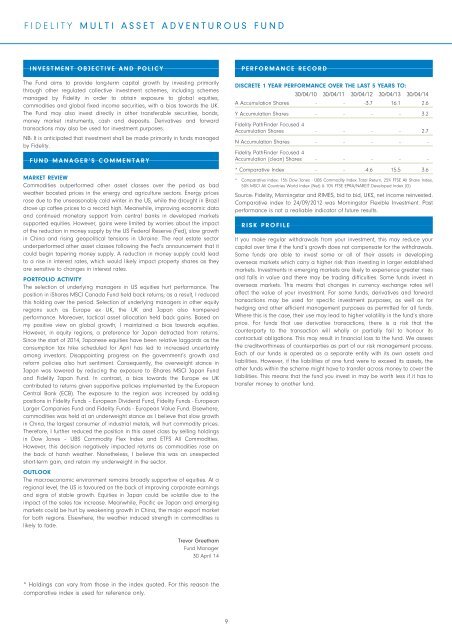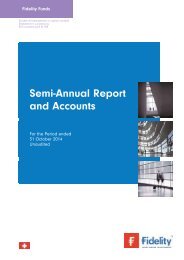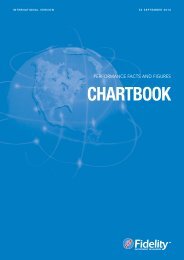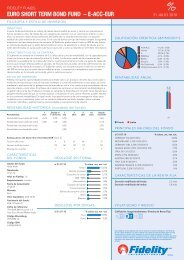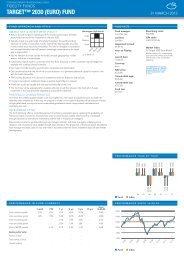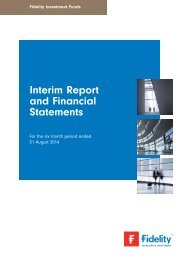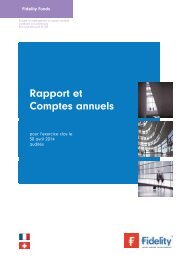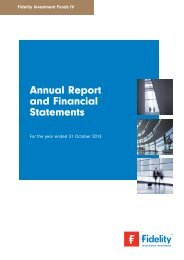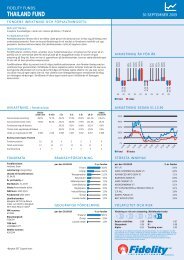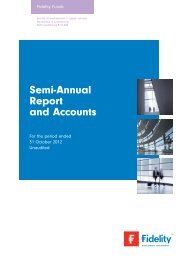Semi-Annual Reports and Accounts - Fidelity Worldwide Investment
Semi-Annual Reports and Accounts - Fidelity Worldwide Investment
Semi-Annual Reports and Accounts - Fidelity Worldwide Investment
You also want an ePaper? Increase the reach of your titles
YUMPU automatically turns print PDFs into web optimized ePapers that Google loves.
FIDELITY MULTI ASSET ADVENTUROUS FUNDINVESTMENT OBJECTIVE AND POLICYThe Fund aims to provide long-term capital growth by investing primarilythrough other regulated collective investment schemes, including schemesmanaged by <strong>Fidelity</strong> in order to obtain exposure to global equities,commodities <strong>and</strong> global fixed income securities, with a bias towards the UK.The Fund may also invest directly in other transferable securities, bonds,money market instruments, cash <strong>and</strong> deposits. Derivatives <strong>and</strong> forwardtransactions may also be used for investment purposes.NB: It is anticipated that investment shall be made primarily in funds managedby <strong>Fidelity</strong>.FUND MANAGER’S COMMENTARYMARKET REVIEWCommodities outperformed other asset classes over the period as badweather boosted prices in the energy <strong>and</strong> agriculture sectors. Energy pricesrose due to the unseasonably cold winter in the US, while the drought in Brazildrove up coffee prices to a record high. Meanwhile, improving economic data<strong>and</strong> continued monetary support from central banks in developed marketssupported equities. However, gains were limited by worries about the impactof the reduction in money supply by the US Federal Reserve (Fed), slow growthin China <strong>and</strong> rising geopolitical tensions in Ukraine. The real estate sectorunderperformed other asset classes following the Fed’s announcement that itcould begin tapering money supply. A reduction in money supply could leadto a rise in interest rates, which would likely impact property shares as theyare sensitive to changes in interest rates.PORTFOLIO ACTIVITYThe selection of underlying managers in US equities hurt performance. Theposition in iShares MSCI Canada Fund held back returns; as a result, I reducedthis holding over the period. Selection of underlying managers in other equityregions such as Europe ex UK, the UK <strong>and</strong> Japan also hamperedperformance. Moreover, tactical asset allocation held back gains. Based onmy positive view on global growth, I maintained a bias towards equities.However, in equity regions, a preference for Japan detracted from returns.Since the start of 2014, Japanese equities have been relative laggards as theconsumption tax hike scheduled for April has led to increased uncertaintyamong investors. Disappointing progress on the government’s growth <strong>and</strong>reform policies also hurt sentiment. Consequently, the overweight stance inJapan was lowered by reducing the exposure to iShares MSCI Japan Fund<strong>and</strong> <strong>Fidelity</strong> Japan Fund. In contrast, a bias towards the Europe ex UKcontributed to returns given supportive policies implemented by the EuropeanCentral Bank (ECB). The exposure to the region was increased by addingpositions in <strong>Fidelity</strong> Funds – European Dividend Fund, <strong>Fidelity</strong> Funds - EuropeanLarger Companies Fund <strong>and</strong> <strong>Fidelity</strong> Funds - European Value Fund. Elsewhere,commodities was held at an underweight stance as I believe that slow growthin China, the largest consumer of industrial metals, will hurt commodity prices.Therefore, I further reduced the position in this asset class by selling holdingsin Dow Jones – UBS Commodity Flex Index <strong>and</strong> ETFS All Commodities.However, this decision negatively impacted returns as commodities rose onthe back of harsh weather. Nonetheless, I believe this was an unexpectedshort-term gain, <strong>and</strong> retain my underweight in the sector.OUTLOOKThe macroeconomic environment remains broadly supportive of equities. At aregional level, the US is favoured on the back of improving corporate earnings<strong>and</strong> signs of stable growth. Equities in Japan could be volatile due to theimpact of the sales tax increase. Meanwhile, Pacific ex Japan <strong>and</strong> emergingmarkets could be hurt by weakening growth in China, the major export marketfor both regions. Elsewhere, the weather induced strength in commodities islikely to fade.PERFORMANCE RECORDDISCRETE 1 YEAR PERFORMANCE OVER THE LAST 5 YEARS TO:30/04/10 30/04/11 30/04/12 30/04/13 30/04/14A Accumulation Shares - - -3.7 16.1 2.6Y Accumulation Shares - - - - 3.2<strong>Fidelity</strong> PathFinder Focused 4Accumulation Shares - - - - 2.7N Accumulation Shares - - - - -<strong>Fidelity</strong> PathFinder Focused 4Accumulation (clean) Shares - - - - -* Comparative Index - - -4.6 15.5 3.6* Comparative Index: 15% Dow Jones - UBS Commodity Index Total Return, 25% FTSE All Share Index,50% MSCI All Countries World Index (Net) & 10% FTSE EPRA/NAREIT Developed Index (G)Source: <strong>Fidelity</strong>, Morningstar <strong>and</strong> RIMES, bid to bid, UK£, net income reinvested.Comparative index to 24/09/2012 was Morningstar Flexible <strong>Investment</strong>. Pastperformance is not a realiable indicator of future results.RISK PROFILEIf you make regular withdrawals from your investment, this may reduce yourcapital over time if the fund’s growth does not compensate for the withdrawals.Some funds are able to invest some or all of their assets in developingoverseas markets which carry a higher risk than investing in larger establishedmarkets. <strong>Investment</strong>s in emerging markets are likely to experience greater rises<strong>and</strong> falls in value <strong>and</strong> there may be trading difficulties. Some funds invest inoverseas markets. This means that changes in currency exchange rates willaffect the value of your investment. For some funds, derivatives <strong>and</strong> forwardtransactions may be used for specific investment purposes, as well as forhedging <strong>and</strong> other efficient management purposes as permitted for all funds.Where this is the case, their use may lead to higher volatility in the fund’s shareprice. For funds that use derivative transactions, there is a risk that thecounterparty to the transaction will wholly or partially fail to honour itscontractual obligations. This may result in financial loss to the fund. We assessthe creditworthiness of counterparties as part of our risk management process.Each of our funds is operated as a separate entity with its own assets <strong>and</strong>liabilities. However, if the liabilities of one fund were to exceed its assets, theother funds within the scheme might have to transfer across money to cover theliabilities. This means that the fund you invest in may be worth less if it has totransfer money to another fund.Trevor GreethamFund Manager30 April 14* Holdings can vary from those in the index quoted. For this reason thecomparative index is used for reference only.9


